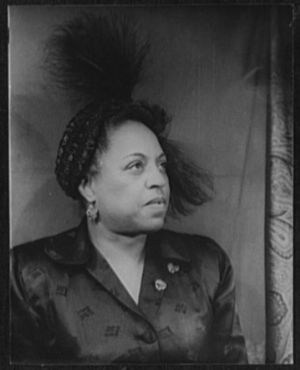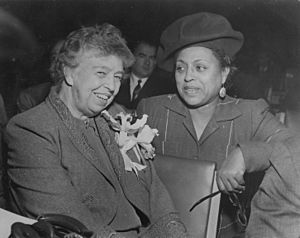Edith S. Sampson facts for kids
Quick facts for kids
Edith S. Sampson
|
|
|---|---|

Sampson in 1949,
photographed by Carl Van Vechten |
|
| Born |
Edith Spurlock
October 13, 1901 |
| Died | October 8, 1979 (aged 77) |
| Nationality | United States of America |
| Occupation | Lawyer and judge |
| Known for | first Black U.S. delegate appointed to the United Nations |
Edith Spurlock Sampson (October 13, 1901 – October 8, 1979) was an amazing American lawyer and judge. She made history on August 24, 1950, when she became the first Black person from the United States to be a delegate at the United Nations. Even though she knew Black people didn't have equal rights in America at the time, she famously said, "I would rather be a Negro in America than a citizen in any other land."
Contents
Early Life and Education
Edith Sampson was one of eight children. She was born into a Black family in Pittsburgh, Pennsylvania. When she was 14, she had to leave school to help her family financially. She found work cleaning fish at a market.
Later, she went back to school and graduated from Peabody High School. After that, she worked for a charity called Associated Charities. She also studied at the New York School of Social Work. One of her teachers, George Kirchwey from Columbia University, saw how smart she was in a class about crime. He encouraged her to become a lawyer.
Edith married Rufus Sampson, and they moved to Chicago. While working full-time as a social worker during the day, she studied law at night. In 1925, she graduated from John Marshall Law School. She even earned a special award for being the best in her law class!
Becoming a Lawyer
In 1924, Edith Sampson opened her own law office in Chicago's South Side. She helped the local Black community with their legal needs. From 1925 to 1942, she worked with the Juvenile Court of Cook County as a probation officer. This meant she helped young people who had gotten into trouble.
In 1927, Edith made history again. She became the first woman to earn a Master of Laws degree from Loyola University's Law School. That same year, she passed the bar exam, which allowed her to officially practice law in Illinois. By 1934, she was allowed to argue cases before the highest court in the country, the Supreme Court of the United States.
In 1943, she joined the National Association of Women Lawyers, becoming one of the first Black members. Later, in 1947, she was appointed an Assistant State's Attorney in Cook County.
Working on the World Stage
In 1949, Edith Sampson took part in a special program called the "Round-the-World Town Meeting." This program sent 26 important Americans on a trip around the world. They met with leaders in other countries and talked about important issues on the radio.
During these meetings, Edith worked to correct false information about how Black Americans were treated in the U.S. This was especially important during the Cold War, when the Soviet Union was spreading negative stories. In India, she bravely said:
The question is, quite bluntly, "Do Negroes have equal rights in America?" My answer is no, we do not have equal rights in all parts of the United States. But let's remember that 85 years ago Negroes in America were slaves and were 100 per cent illiterate. And the record shows that the Negro has advanced further in this period than any similar group in the entire world. You here get considerable misinformation about American Negroes and hear little or nothing that is constructive.
She also repeated her famous line: "I would rather be a Negro in America than a citizen in any other land." William O. Douglas, a Supreme Court Justice, said that her actions helped create a lot of good feelings and understanding in India.
Edith Sampson also spoke out against Soviet communism. She compared it to slavery and accused the Soviet Union of holding prisoners of war from World War II as slaves. She reportedly told the Soviet Ambassador, "We Negroes aren't interested in Communism... We were slaves too long for that. Nobody is happy with second-class citizenship, but our best chances are in the framework of American democracy."
At the United Nations

Because of her work on the Town Meeting tour and her public speaking, President Truman chose Edith Sampson to be an alternate U.S. delegate to the United Nations. This happened on August 24, 1950. This made her the first African-American to officially represent the United States at the UN.
She was part of the UN's Social, Humanitarian, and Cultural Committee. Here, she pushed for continued support for social welfare programs. She also proposed a plan to pressure the Soviet Union to send home its prisoners of war from World War II. She served at the UN until 1953.
Later, during the Eisenhower Administration, she was a member of the U.S. Commission for UNESCO. In 1961 and 1962, she became the first Black U.S. representative to NATO.
Becoming a Judge
In 1962, Edith Sampson ran for associate judge of the Municipal Court of Chicago. She won the election easily. This made her the first Black woman to be elected as a judge in the state of Illinois.
In 1966, she became an associate judge for the Circuit Court of Cook County. She often heard cases about housing problems involving people who were struggling. Many saw her as "an understanding but tough grandmother" in these cases.
She continued to serve as a Circuit Court judge until she retired in 1978. Edith Sampson passed away in Chicago in October 1979.
Family Life
Edith Sampson first married Rufus Sampson. They later divorced, but she kept his last name because she was already known professionally as Edith Sampson. In 1935, she married another lawyer, Joseph E. Clayton. They worked together in their law practice until he passed away in 1957.
Edith's family included other notable people. Two of her nephews, Charles T. Spurlock and Oliver Spurlock, also became judges. Her niece, Jeanne Spurlock, was the first African American woman to become a dean of an American medical school. Edith's great-niece, Lynne Moody, is an actress who appeared in the famous TV miniseries Roots. In 1952, Edith Sampson became an honorary member of Zeta Phi Beta Sorority, Inc.
See also
- List of African-American jurists
- List of first women lawyers and judges in Illinois
 | Emma Amos |
 | Edward Mitchell Bannister |
 | Larry D. Alexander |
 | Ernie Barnes |

